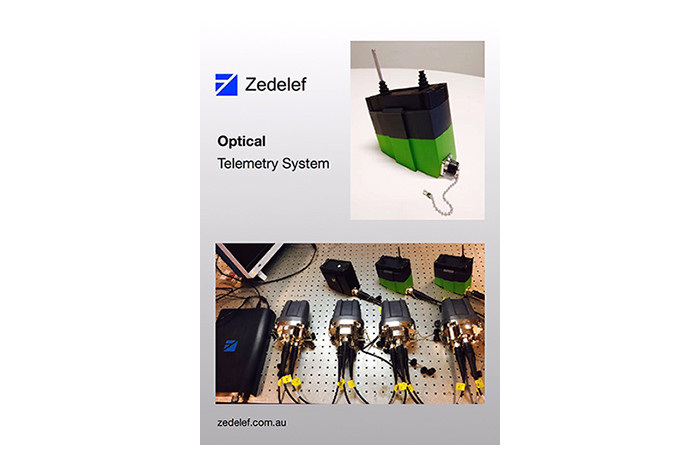We use cookies to give you a better experience on our website. Learn more about how we use cookies and how you can select your preferences.
Zedelef – Transducing technology enables a new generation of optical sensor networks

Company Profile
Company: Zedelef Pty Ltd
Sector: Manufacturing
Location: New South Wales
Profile: Zedelef is a start-up company created to commercialise technologies developed by its 3 founders from the University of New South Wales. Its mission is to become a leading supplier of optical sensing network technologies for industrial applications.
Why R&D was needed
Industrial monitoring is broad in application and is used across many industries, including mining, ocean monitoring for surveillance and geo-seismic exploration and monitoring oil and gas distribution systems.
Examples of specific industrial monitoring applications include weather monitoring, mine ventilation, air temperature, equipment performance and environmental compliance.
Only intrinsically safe equipment can be used in such hazardous environments, often restricting the amount of monitoring that is carried out.
As part of ongoing R&D carried out at the University of New South Wales, 3 researchers developed an innovative approach to industrial monitoring using optical technology.
Based on optical fibres and liquid crystals, the technology developed has simplified existing sensing systems. The optical sensor network was patented in 2012 when Zedelef was established. The company has produced commercial products from the technology.
Because the Zedelef technology is relatively new, the company needs to convince key decision makers that the optical sensor network is intrinsically safe and offers better value for money.
CEO François Ladouceur explains that the optical fibres and liquid crystal technology is safe in its nature, has substantial cost savings and makes more detailed and extensive monitoring possible.
He believes that whilst the technology offers a cost reduction for each unit, companies will want to use the cost savings to expand their monitoring programs.
“Industry partners we've spoken to see the benefit of the technology in being able to measure and monitor more for the same price” he said.
How the Research and Development Tax Incentive Helps
Zedelef has taken part in the Research and Development Tax Incentive (R&DTI) program for more than 4 years. Professor Ladouceur says that participation has meant the company has managed to step up its R&D program.
“The program is a motivation to structure your R&D from the start and expenses are tracked better as a result," Professor Ladoouceur said.
Because Zedelef is a high-tech start-up company operating out of a university, R&D accounts for most of the activity undertaken, with 70 to 80% of all expenses being R&D related. Between 2014 and 2017, Zedelef received more than $240,000 directly from the R&DTI program and secured another $500,000 investment thanks in part to their participation in the program.
Professor Ladouceur said that Zedelef's focus is R&D heavy so the R&DTI program is attractive to investors as they can see each dollar they invest goes further.
Zedelef has demonstrated their product across Australia and in France to receive support from a multinational industry partner, Schneider Electric. Schneider Electric has invited Zedelef to put together a business proposal to help them to build further support for their products.
Attracting investment in research and development activities is difficult in Australia given how high the labour costs are when compared with China or some European countries. Professor Ladouceur said that the R&DTI makes investing in Zedelef more attractive as the tax benefit goes towards offsetting higher Australian labour costs.
Zedelef has been able explore new applications of their technology thanks in part to the R&DTI program. Investigating new applications can cost tens of thousands of dollars so by making a tax saving, the money they've needed to explore these opportunities has been available.
The growth that Zedelef has enjoyed because of the R&DTI program and the investment they have secured has enabled the company to offer internship opportunities to approximately ten students from the University of New South Wales. This opportunity has given students a valuable insight into the R&D work that Zedelef carry out. In addition to this, Zedelef have also employed one of the former students on a full-time basis.
Professor Ladouceur believes that participation in the R&DTI program has had a profound impact on his business as well as other start-ups within the high-tech sector.
“The R&DTI program helps start-ups to get off the ground and has been a factor that has kept the R&D for this kind of technology in Australia. The end of the R&DTI program would be catastrophic for us and certainly detrimental to any start up in the high-tech sector.” Professor Ladouceur says.
All we do is research and development, as such, 70-80% of our expenses are R&D related … so for us, the R&D tax incentive program is fundamental.
R&DTI Impact Facts
- Secured $500,000 in investment thanks partly to the R&DTI program
- Received over $240,000 directly from the R&DTI program in the past 4 years
- Incorporates optic technology in monitoring processes so industries can monitor more
- Reduced monitoring cost per channel so more channels can be adopted
- Attract and retain investors as their money goes much further